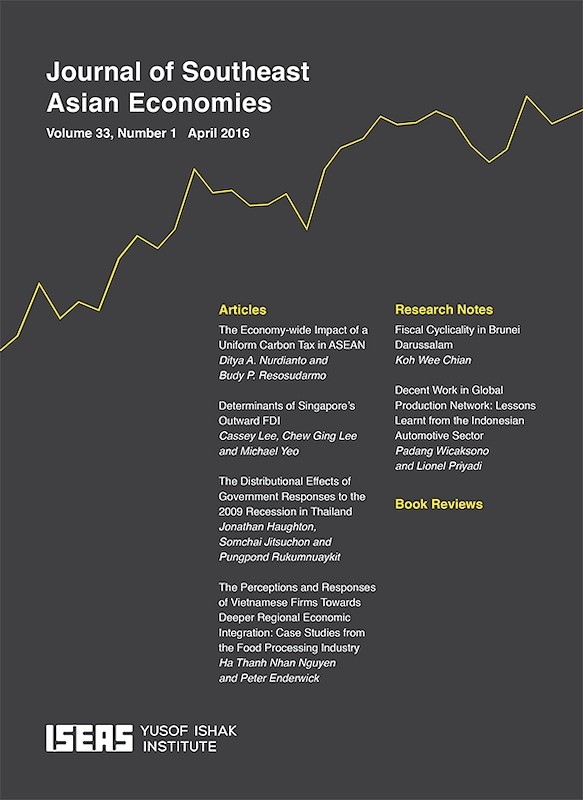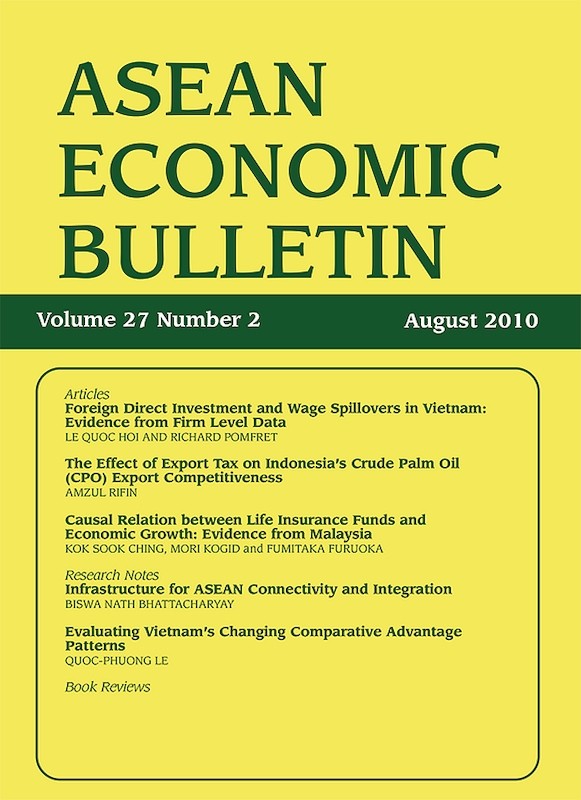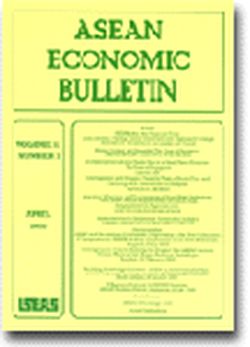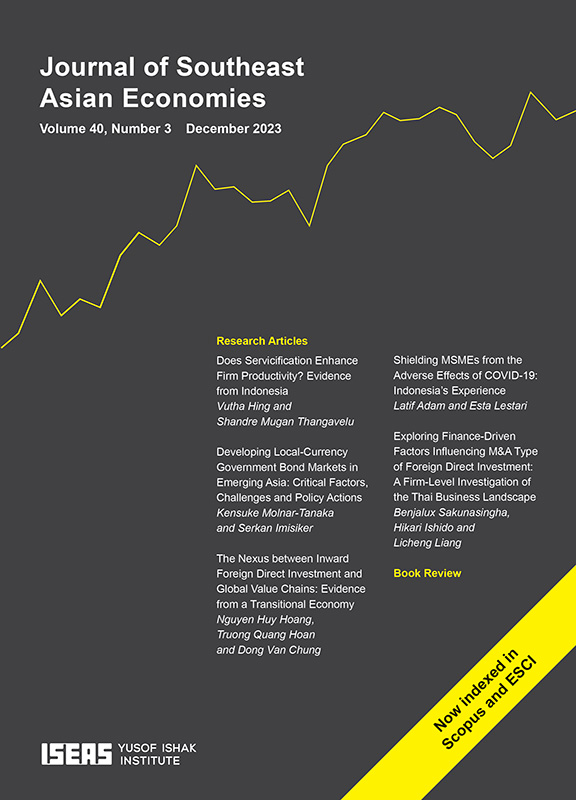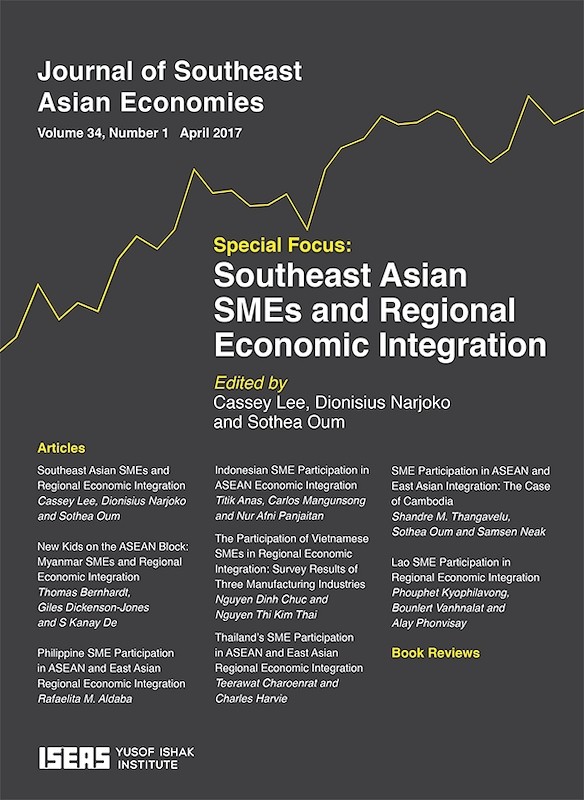ASEAN Economic Bulletin Vol. 29/2 (Aug 2012)
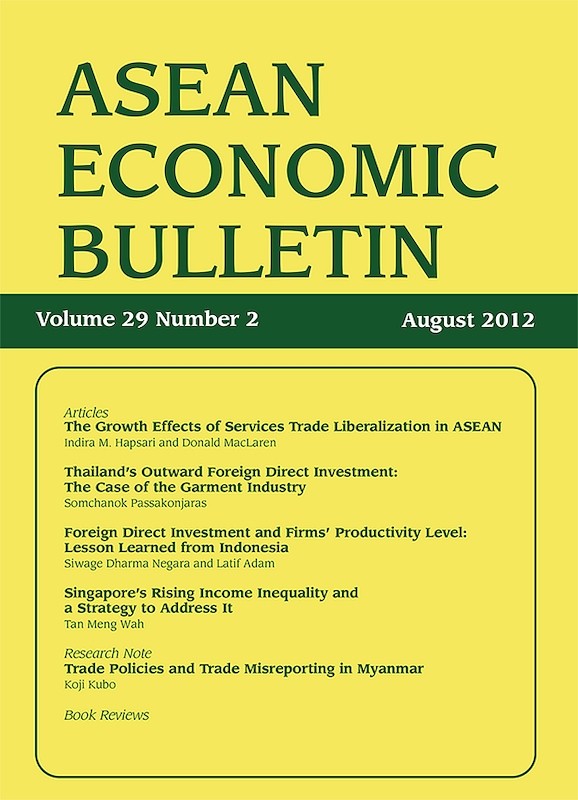
Date of publication:
August 2012
Publisher:
Institute of Southeast Asian Studies
Number of pages:
90
Code:
AE29/2
Contents
-
ASEAN Economic Bulletin Vol. 29/2 (Aug 2012)
[Whole Publication] -
Preliminary pages
- ARTICLES
-
The Growth Effects of Services Trade Liberalization in ASEAN, by Indira Hapsari, Donald MacLaren, authors see abstractThe effects of liberalization in services trade in ASEAN countries are investigated using regression analysis and a constructed measure of reform in the services sectors of ASEAN-5. It is found that the openness index measuring the level of liberalization in financial services sector through the ASEAN Framework Agreement on Services (AFAS) and the General Agreement on Trade in Services (GATS) is significant in affecting the rate of economic growth amongst five member countries of ASEAN. However, it has not been possible to isolate the effects of AFAS from those GATS because there has been little difference in the commitments contained in each of them. Moreover, as GATS came into being in 1995 and AFAS two years later, there is insufficient data to measure the effects of each Agreement separately.
-
Thailand's Outward Foreign Direct Investment: The Case of the Garment Industry, by Somchanok Passakonjaras, author see abstractOutward foreign direct investment (OFDI) of Thai garment industry and the differences between firms with and without OFDI are explored by interview and survey during June and December 2008. Efficiency seeking is the most important OFDI motive, while labour shortage and general cost pressure are the most important push factors. Incentives, capacity building, and market intelligence are home government measures that firms are looking for. Firms with OFDI have higher levels of management proficiency than firms without OFDI due to their larger size and being more ready in terms of market to serve and production technology. Most activities of OFDI are production based. Low labour costs and cultural proximity are among the most important criteria in investment location selection. Generally, the reasons for OFDI in garment industry from Thailand to be minimal can be both internal and external factors. For internal factors, it is shown that firms with no OFDI are far behind those with OFDI in terms of management proficiency, capital resources (size), and firm readiness. It is thus suggested that Thai garment firms need to upgrade their factors of production and focus more on management skills if they want to expand internationally. Regarding external factors, home government policies that incentivize firms pursuing OFDI are still lacking. It istherefore suggested that the Thai (home) government not only develop policies that help push OFDI in the short run but also need to improve the location (L) advantages which in turn will help indigenous firms to upgrade their ownership (O) specific competitive advantages in the long run.
-
Foreign Direct Investment and Firms Productivity Level: Lesson Learned from Indonesia, by Siwage Dharma Negara, Latif Adam, authors see abstractThis paper analyses the effects of foreign direct investment (FDI) on local firms productivity in Indonesia. We found evidence of increased local firms productivity associated with the presence of FDI. Our estimate shows that intra-industry and forward linkage mechanisms have a positive effect on local firms productivity. This suggests that FDI may have stimulated emulation in the domestic firms through demonstration effect and inter-firm worker mobility within the same type of industry, which will in turn result in an improvement of the productivity of the domestic firms. However, despite those positive effects, we argue that Indonesia has not been successful in maximizing the benefits from the presence of FDI. In particular, FDI does not contribute to the development of local supporting industries as it failed to promote backward linkage spillover. For this reason, Indonesia needs to provide the right incentives to encourage FDI for the development of domestic supporting industries.
-
Singapore's Rising Income Inequality and a Strategy to Address It, by Tan Meng Wah, author see abstractThis paper starts by tracing how Singapores path of incessant economic upgrading and restructuring over the decades has led to the emergence of a two-speed dual economy characterized by falling productivity and a widening income gap. This is followed by an indepth analysis of government efforts to foster absolute inclusive growth through redistribution against recent suggestions of building relative inclusive growth through more equitable distribution of gains from economic development using a wage-shock approach. Finally, the paper explains why the Governments strategy of linking wage adjustments to productivity growth may be no panacea to bridging the income gap and how relative inclusive growth can be better achieved by adopting a more incremental approach of wage adjustments, starting first with businesses and workers providing non-critical services in non-tradable sector.
- RESEARCH NOTE
-
Trade Policies and Trade Misreporting in Myanmar, by Koji Kubo, author see abstractWhile the trade statistics of Myanmar show surpluses for 2007 through 2010, the corresponding statistics of trade partner countries indicate deficits. Such discrepancies in mirror trade statistics are analysed in connection with the export-first and import-second policy provisioning import permissions on permission applicants possessing a sufficient amount of the export-tax-deducted export earnings. Under this policy, the recorded imports and exports of the private sector have been maintaining equilibrium, whereas discrepancies in the mirror statistics have fluctuated. This suggests that traders adjusted misreporting in accordance with the supply and demand of the export earnings.
- BOOK REVIEWS
-
BOOK REVIEW: Cashing In Across the Golden Triangle: Thailand's Northern Border Trade with China, Laos, and Myanmar, by Thein Swe and Paul Chambers., by Robert L Curry, Jr., author
-
BOOK REVIEW: Paths to Development in Asia: South Korea, Vietnam, China and Indonesia, by Tuong Vu., by Francis E Hutchinson, author
-
BOOK REVIEW: The Political Economy of Capital Market Reforms in Southeast Asia, by Xiaoke Zhang., by G Sivalingam, author
-
BOOK REVIEW: Why Nations Fail: The Origins of Power, Prosperity and Poverty, by Daron Acemoglu and James A. Robinson., by Himanshu Jha, author

